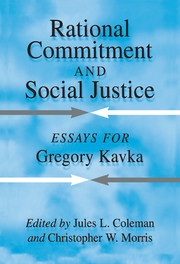Book contents
- Frontmatter
- Contents
- Acknowledgments
- List of Contributors
- Introduction: The Moral and Political Philosophy of Gregory Kavka
- Some Personal Memories
- The Shadow of the Future
- A New Paradox of Deterrence
- Rethinking the Toxin Puzzle
- Toxin, Temptation, and the Stability of Intention
- The Toxin Puzzle
- Religion and Morality in Hobbes
- Contemporary Uses of Hobbes's Political Philosophy
- The Knavish Humean
- Some Considerations in Favor of Contractualism
- Justice, Reasons, and Moral Standing
- Wrongful Life: Paradoxes in the Morality of Causing People to Exist
- Gregory S. Kavka's Writings
Justice, Reasons, and Moral Standing
Published online by Cambridge University Press: 28 October 2009
- Frontmatter
- Contents
- Acknowledgments
- List of Contributors
- Introduction: The Moral and Political Philosophy of Gregory Kavka
- Some Personal Memories
- The Shadow of the Future
- A New Paradox of Deterrence
- Rethinking the Toxin Puzzle
- Toxin, Temptation, and the Stability of Intention
- The Toxin Puzzle
- Religion and Morality in Hobbes
- Contemporary Uses of Hobbes's Political Philosophy
- The Knavish Humean
- Some Considerations in Favor of Contractualism
- Justice, Reasons, and Moral Standing
- Wrongful Life: Paradoxes in the Morality of Causing People to Exist
- Gregory S. Kavka's Writings
Summary
The notions of right and wrong, justice and injustice, have there no place.
Leviathan, ch. xiiiThe best account of the virtue of justice, I have long thought, is that offered by a certain type of contractarianism. This sort of approach seeks to base justice in mutual advantage. The implications it yields are clearly revisionist. As David Gauthier acknowledges, “No doubt there will be differences, perhaps significant, between the impartial and rational constraints supported by [contractarian morality]… and the morality learned from parents and peers, priests and teachers.” To many moral philosophers these sorts of revisionist implications are the basis for rejecting the whole approach.
Gregory S. Kavka has identified a particular source of these revisionist implications, and he has dubbed it “the problem of group egoism.” He notes that these sorts of contractarian theories “appeal, in one form or another, to reciprocity: compliance with moral constraints benefits you because it facilitates the cooperation (and like compliance) of others, and you – like everyone else – need such cooperation to get along in the world.” This approach, however, gives rise to this problem of group egoism.
Everyone does need the cooperation of others to get by in this world. But not all others. Only enough suitably placed. Hence, if the only rational ground of compliance with moral constraints is reciprocity, the scope of moral protection would seem to extend only to cover potential reciprocators. More specifically, while all individuals may need cooperation from other individuals in their group, members of powerful groups may not need the cooperation of the members of weak groups.
- Type
- Chapter
- Information
- Rational Commitment and Social JusticeEssays for Gregory Kavka, pp. 186 - 207Publisher: Cambridge University PressPrint publication year: 1998
- 9
- Cited by



